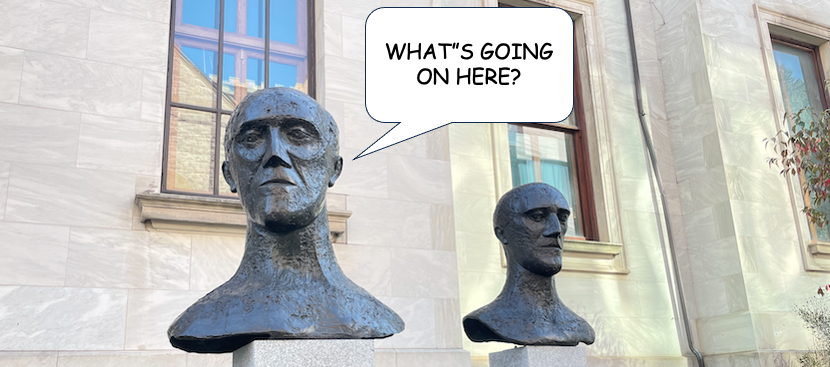Moderator: Welcome to another edition of Supremacy Debates, where we have a quantum computer go against a classical computer to determine who is better.

Moderator: On my left, looking sleek and calm, we have classical computer.
Classical Computer: Hola!
Moderator: On my right, looking frazzled and overworked, we have a quantum computer.
Quantum Computer: Howdy folks!
Moderator: I will let Classical Computer take the floor.
Classical Computer: Thank you, moderator. This man, this quantum computer as he calls himself, cannot even do simple things that I can do easily. Let me demonstrate. Dear Quantum Computer, can you run Excel?
Quantum Computer: Umm, no.
Classical Computer: Can you send an email?
Quantum Computer: Umm, no. Dude, you know I can’t use the internet. Ask me other things.
Classical Computer: Okay, something simple then. If I give you a large number, say 1007, can you give me its prime factors?
Quantum Computer: Well, I cannot. Not right now.
Classical Computer: So what can you do really? Can you add two numbers? Can you add 15 to 27?
Quantum Computer: (embarrassed) No.
Classical Computer: Ladies and Gentlemen, as you can see, the quantum computer is utterly incapable of doing even the most elementary things. How can it even lay claim to supremacy when everything the quantum computer can do, I can do better? I call this debate settled!
Quantum Computer: HOLD ON A SECOND!!
Moderator: Ladies and Gentlement, Quantum Computer is visibly outraged.
Quantum Computer: The debate IS CERTAINLY not settled. Ladies and Gentlemen, this man is using a unfair line of questioning, asking me to do things that it knows I am not designed for. Yes, I am not designed for emails, nor playing games, not running Excel. Moderator, could you clarify something for me?
Moderator: Certainly.
Quantum Computer: My opponent just said that he can do everything I can do, but better. To win this debate, is it enough for me to show that there is at least one job that I can do but my opponent cannot?
Moderator: Ehhhh, let me look at the rules. Yes, that would be enough, under the terms of this debate.
Quantum Computer: Okay give me a second. Let me fetch something.
Moderator: (Uh oh) Quantum computer seems to be pulling something out of his backpack. What is he grabbling? Uh oh, he has just pulled out A BUNCH OF QUANTUM PROGRAMS!! HOLY SHIT!
Quantum Computer: These are quantum programs, made specifically for me by my manufacturer. Each of these programs does not give a single result, but it produces a probability distribution on numbers. When I run this quantum program, I can sample randomly from that distribution. Now I challenge my opponent to run these programs and sample from their distributions.
Classical Computer: This is not fair.
Quantum Computer: Oh? Is it not? Let’s start with the easiest. (takes the smallest quantum program) Let me run it right now. (produces a list of numbers two seconds later). Okay look, here is the list of numbers corresponding to the program I just ran. Moderator, could you verify that the numbers do indeed come from the distribution induced by the program I just executed?
Moderator: Give me a minute. (a few moments later) Indeed, the numbers on this list appear to be mostly drawn from the right distribution.
Quantum Computer: Now, classical computer. I dare you to run the same program.
Classical Computer: (takes the quantum program, turns it around a few times and executes it. After a few minutes, it finishes the job.) I admit it wasn’t easy, but it looks like I can do it. Here is my list. Moderator, can you check if my numbers are as good as the quantum computer’s?
Moderator: Actually, these numbers are excellent. Classical computer seems to have done the task as well as the quantum computer. He might have even done it better.
Quantum Computer: That’s because I was going easy on him. Let’s now move on to the bigger quantum program. I can run this big quantum program just as easily as I can run the small program. (two seconds later). Here are the numbers corresponding to the new program. Moderator, do check if it looks right.
Moderator: Looks good to me. They aren’t as perfect as the last time, but still decent. Now, Classical Computer, can you do better?
Classical Computer: (sweating) I am not sure if I can run the bigger program.
Moderator: If you don’t try, you will forfeit the competition.
Quantum Computer: Come on Classical Computer, at least give it a try. Would be a pity if you gave up so easily.
The classical computer reluctantly takes the large quantum program, and tries to run it. Ten minutes later, the classical computer is sweating and quivering. An hour later, he is close to breaking down.
Classical Computer: I CANNOT DO THIS!! I GIVE UP!
Quantum Computer: Well, well, well. It only took you an hour to give up.
Classical Computer: These programs are too difficult for me, it would take me years to sample from these programs. But this is grave injustice. These programs don’t even do anything useful, they just produce a bunch of random numbers.
Quantum Computer: This whole debate is not about doing useful things, is it Moderator?
Moderator: No. The quantum computer is right. As long as the tasks can be defined accurately, they can be absolutely meaningless.
Quantum Computer: That’s right. The tasks can be meaningless. And, that ladies and gentlemen, proves that there are indeed tasks that I can do that my opponent cannot. I have therefore attained quantum supremacy.

Moderator: Ladies and Gentlemen, I believe we have a winner. Quantum Computer has successfully demonstrated an existence of a task, however pointless, that a classical computer cannot do quickly.
Classical Computer: (whimpering) Every time I send an email or run Excel, I attain classical supremacy. Everytime I do something useful, I attain classical supremacy.
Moderator: The rules are straightforward: the clear, obvious, undisputed winner is the quantm computer. Now, we will let the New York Times cover this story.
